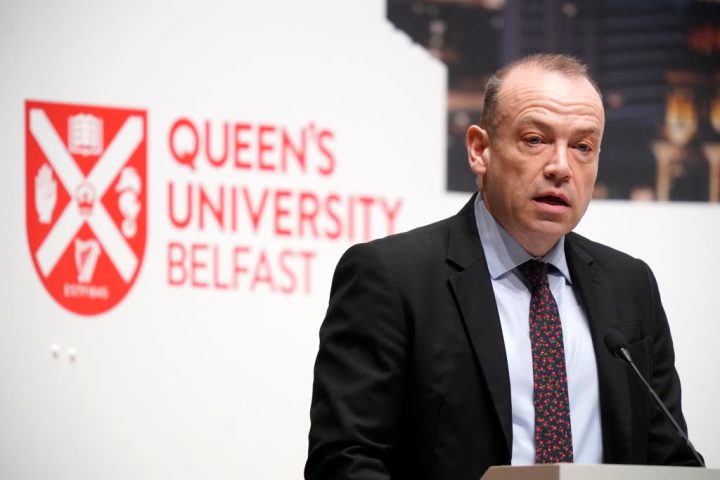Amidst the veneration of the Belfast Agreement taking place at Queen’s University this week, there has been a less than subtle message: that the DUP should get back to work and re-join the devolved executive at Stormont. One of the many banging that particular drum – and unlikely to feature in any Orange parade this July – is Chris Heaton-Harris, the Northern Ireland Secretary.
Heaton-Harris’s speech to those gathered in Belfast yesterday was a browbeating performance par excellence which has raised unionist hackles rather than assuaged them. But while his speech grabbed the headlines for this reason, it also contained an extraordinary appraisal of the history of Northern Ireland and bizarre phraseology for a supposed unionist to use.
If the attitude of the Northern Ireland Office is to seriously engage in revisionism, then the culture within it is worse than many feared
According to Heaton-Harris, Gerry Adams and Martin McGuinness deserved to be remembered ‘for the courage and leadership showed in persuading the Republican movement of peace’. Most may remember the two of them for something else which the Secretary of State failed to acknowledge, notably for the years before 1998 and their alleged outsized roles in a sectarian terrorist campaign which was doomed to failure from the start. It also often goes unsaid that Adams and McGuinness coincidentally discovered their ‘courage’ at a time of strategic reversals for the Provisional IRA. Adams denies ever being a member of the paramilitary organisation.
Of course, it may have been somewhat gauche and against the mood music at the conference for Heaton-Harris to call out Adams and McGuinness for being slow learners. However, as a statement, it is without question one of the most ahistorical and profoundly stupid things ever uttered by a Northern Ireland Secretary. Little wonder that victims and survivors’ groups are up in arms.
Elsewhere in this historical review, Heaton-Harris turned to two unionists, David Trimble and David Ervine. Both men are now dead, and Heaton-Harris said they ‘led not only their own parties but Unionism and Loyalism in saying yes to peace’.
In Ervine’s case, this is fair comment. A member of the Ulster Volunteer Force and leader of its political wing, the Progressive Unionist party, he played a crucial role in persuading loyalist terrorists of the merits of peace and helped deliver their 1994 ceasefire.
Yet the inclusion of Trimble in the same breath as Ervine and the phraseology which implies unionists needed persuading about the merits of peace is again, odd. It suggests that Trimble had a challenge on his hands convincing ordinary, workaday unionists of the merits of abandoning violence, as though they were engaged in a campaign similar to the terrorists. Nothing could be further from the truth and to even stray close to suggesting so is egregiously revisionist.
Gavin Robinson, the DUP MP for East Belfast, was right to say the Secretary of State’s address was ‘more akin to a speech by a clueless Irish American congressman rather than a UK government cabinet minister’.
It has always been thus with the Northern Ireland Office; if ever a branch of the UK state was green around the gills, it is this one. Famously, one of Heaton-Harris’ predecessors, Peter Brooke, said Britain had no ‘selfish or strategic interest’ in the place. The Office’s institutional ambivalence to the cause of Northern Ireland remaining in the UK has long been a source of frustration for unionists.
The Northern Ireland Office is entitled to push government policy. It is no surprise that, afforded the opportunity by the 25th anniversary of the agreement, it sought to push the Windsor Framework and bash the DUP for their refusal to reboot devolution, at least for now.
However, a senior member of the government spinning a reworked narrative about the past as part of an effort to cajole present day politicians is deeply irresponsible. If the attitude of the Northern Ireland Office is to seriously engage in revisionism and claim that Sinn Fein were blessed peace makers and that it was the unionists who needed to be convinced of ‘saying yes to peace’, then the culture within it is worse than many feared.
Little wonder then that Heaton-Harris is fast outpacing one of his predecessors Karen Bradley – who confessed that it was news to her that unionists and nationalists voted for different parties – in the rogues’ gallery of unsuited and unsuitable Northern Ireland secretaries.






Comments